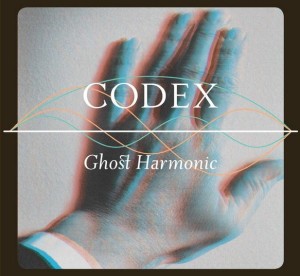Well, what can I say? Around 1/2 way through 2015 I think I’ve found my #1 record of the year. (I still very much stand by my 2014 top choice, SYRO: I listen to it every day. Yep, every single fucking day – no exaggeration. SYRO is brain food for me. And I still LOVE the Charcoal Owls record. Big style!)
Ghost Harmonic’s Codex dropped thru the letterbox this morning with uncanny, almost mystical coincidence. I was piecing some thoughts together on a theme I’ve discussed at length in my book Der Papierkorb ist beschädigt (Chapter: „Vibes“). The theme about how recorded sound collects and inscripts more than just sound waves. For some reason London was in my thoughts, partly because I had been listening to Pink Floyd’s Animals and partly because I’ve recently been reading an interesting blog entitled Growing up on the Isle of Dogs, and also because I’ve been planning a London trip itinerary which involves my favourite coffee shop, which is on Kingsland Road (E2) and various other places, so I’ve been on Google Street view a lot, working out walking distances (and getting lost a lot too, which I value greatly).
It turns out that Codex was recorded at a studio 350 metres away from my coffee place. It also turns out that Codex is very much an embodiment – maybe even an apotheosis – of what I was on about in that chapter of Der Papierkorb ist beschädigt. (From the blurb for Codex: „The spaces in between the musical notes are often overlooked in modern recording,’ says Benge [one of Ghost Harmonic along with Diana Yukawa and John Foxx]. ‘It was these ideas that we wanted to capture on this record. The ‘ghosts’ in the studio that we were listening to for inspiration. The name came out of that.’ John Foxx: ‘I noticed an interesting effect when multi-tracking into long or complex reverbs – certain harmonics would be suppressed or enhanced and previously unheard ones would emerge from the miasma. This can be really beautiful and it’s now what I most listen for – I know a piece is going somewhere new when this sort of thing begins to occur.)
1. A Green Thought in a Green Shade
2. The Pleasure of Ruins
3. Dispersed Memory
4. When We Came to This Shore
5. Codex
This is music you need to get right inside of, like Through The Hill or The Pearl. Is this what music will sound like after the so-called Technological Singularity? Delays, echoes, pscyhoacoustics and the space between notes are things that a lot of my favourite artists explore – people like Edgard Varèse, Vini Reilly, King Tubby. Ghost Harmonic do it in their own magical way. It’s not mega-easy to explain, but I’ll try. You know how there are arbitrarily distributed zones in a city you know well, where a weird kind of magic resides, and viscerally affects you?
It can be a bus stop, a railway bridge, a weird two foot wide demilitarised zone between warehouses where only birds walk. It can be a kebab shop. It can be anywhere. When your psychogeographical filters are applied, these places are easy to spot. The effect can be so strong that you sometimes have to turn round (like a fucking idiot) and go back to where you’ve just been, to get another charge of the mental energy there. If you know that feeling, or the electrically transcendent vibe you can get from looking at an art print of a dog standing outside a beach hut on sale in a department store (an art print no connoisseur would love, hopefully), then you may just get from Codex what I get from it. It’s not ambient but its place is very much imprinted on it. Few releases excite me as much as this one: it’s like a dream where you find a book full of new ideas, but when you turn the pages there is something more than ideas, there’s a primordial mist of ideation/iration itself, leaving you to go ideate.
The tracks here form one continuous track. Some of it has the kind of gloaming time dopamine glow you get from Torn Sunset, one element of the music being devised to be projected onto by another element – holograhic harmonics. Attack ships on fire off the shoulder of Orion. C-beams glittering in the dark near the Tannhäuser Gate. Moments lost in time. Tears in rain. I’ve been listening to the Harold Budd and John Foxx record Nighthawks for about 4 years now and I feel I am beginning to understand it. Codex already feels like I am at the very beginning of another long and absorbing journey in sound/beyond sound.

Important note:
This is an experimental review. In fact, I haven’t heard the record yet. Not a fucking note of it! It didn’t drop thru my letterbox this morning. Hopefully it will next week sometime. (There are soundclips of three tracks online but I haven’t played them yet.)